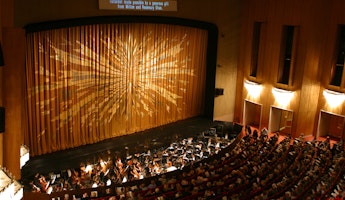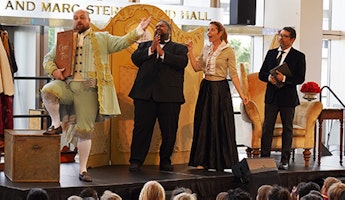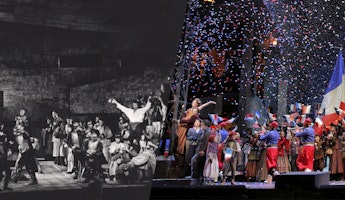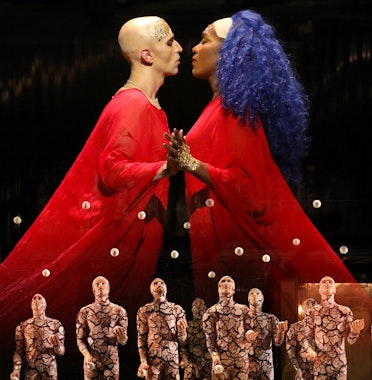
Les Talens Lyriques
The ensemble Les Talens Lyriques, which takes its name from the subtitle of Rameau's opera Les Fêtes d’Hébé (1739), was founded in 1991 by the harpsichordist and conductor Christophe Rousset.
Championing a wide lyrical and instrumental repertoire that spans from early Baroque to early Romanticism, Les Talens Lyriques aim to shed light on the great masterpieces of music history through the lens of rarer or unpublished works, true missing links in the European musical heritage. This musicological and editorial work is a priority for the Ensemble and contributes to its renown.
Les Talens Lyriques journey from Monteverdi (L’Incoronazione di Poppea, Il Ritorno d’Ulisse in patria, L’Orfeo), Cavalli (La Didone, La Calisto), Landi (La Morte d’Orfeo), Pallavicino (Le amazzoni nell’isole fortunate), Legrenzi (La divisione del Mondo) to Handel (Scipione, Riccardo Primo, Rinaldo, Admeto, Giulio Cesare, Serse, Arianna in Creta, Tamerlano, Ariodante, Semele, Alcina, Agrippina, Saul, Messiah, Jephtha, Orlando), passing through Lully (Persée, Roland, Bellérophon, Phaéton, Amadis, Armide, Alceste, Isis, Thésée, Atys, Proserpine), Desmarest (Didon, Vénus et Adonis), Mondonville (Les Fêtes de Paphos), Cimarosa (Il Mercato di Malmantile, Il Matrimonio segreto, L’Olimpiade), Traetta (Antigona, Ippolito ed Aricia), Jommelli (Armida abbandonata), Martin y Soler (La Capricciosa corretta, Il Tutore burlato), Mozart (Mitridate, Die Entführung aus dem Serail, Così fan tutte, Die Zauberflöte), Salieri (La Grotta di Trofonio, Les Danaïdes, Les Horaces, Tarare, Armida, Cublai gran Kan de’ Tartari), Rameau (Zoroastre, Castor et Pollux, Les Indes galantes, Platée, Pygmalion), Gluck (Bauci e Filemone, Alceste, Orphée et Eurydice, Armide), Beethoven, and finally Cherubini (Médée), García (Il Califfo di Bagdad), Berlioz, Massenet, Gounod (Faust), Spontini (La Vestale), Saint-Saëns, Louise Bertin (Fausto), and Schubert (complete symphonies).
The recreation of these works goes hand in hand with close collaboration with directors and choreographers such as Pierre Audi, Jean-Marie Villégier, David McVicar, Eric Vigner, Ludovic Lagarde, Mariame Clément, Jean-Pierre Vincent, Macha Makeïeff, Laura Scozzi, Natalie van Parys, Marcial di Fonzo Bo, Claus Guth, Robert Carsen, David Hermann, Christof Loy, Jetske Mijnssen, Alban Richard, David Lescot, Phia Ménard, Calixto Bieito, Laurent Pelly, Jeanne Desoubeaux, Damiano Michieletto, or Dmitri Tcherniakov.
Besides the lyrical repertoire, the ensemble explores other musical genres such as the madrigal, cantata, air de cour, symphony, and the vast sacred repertoire (mass, motet, oratorio, leçons de ténèbres...). From season to season, Les Talens Lyriques perform worldwide, with ensembles ranging from a few musicians to over 60 performers of all generations. The new season of Les Talens Lyriques for 2024/25, titled "Myths and Stories," will be rich in emblematic works and rediscoveries. Under the direction of Christophe Rousset, the ensemble will explore mythological and legendary stories through six operas and an oratorio. The season will begin with Ifigenia in Aulide by Nicola Porpora, followed by Handel's Orlando and Giulio Cesare, Mozart's Mitridate, Gassmann's L’Opera seria, J.S. Bach's Easter Oratorio, and Lully's Proserpine. Concurrently, Les Talens Lyriques will offer a series of concerts and recitals highlighting notably a young generation of soloists: Paul Figuier and Zoltan Darago (alto), Ambroisine Bré (mezzo-soprano), Lysandre Châlon (bass-baritone), as well as loyal interpreters who will participate in the European and North American tours of the season. The rich discography of Les Talens Lyriques today includes over 100 recordings, published by Erato, Fnac Music, Auvidis, Decca, Naïve, Ambroisie, Virgin Classics, Ediciones Singulares (PBZ), Outhere, Château Versailles Spectacles (CVS), and Aparté. The ensemble also produced the famous soundtrack for Gérard Corbiau's film Farinelli (1994), which sold over a million copies.
The new season will see the release of four albums for Christophe Rousset and Les Talens Lyriques: Airs de Cantates pour alto with Zoltan Darago (Aparté – September 2024) and the world premiere recreation of Antonio Salieri's Cublai, gran Kan de’ Tartari (Aparté – April 2025). The complete harpsichord pieces by François Couperin, recorded by Christophe Rousset, will finally be reissued in digital format (Harmonia Mundi – August 2024), followed by the release of The Complete Toccatas, magnificently concluding Christophe Rousset's exploration of J.S. Bach's keyboard corpus (Aparté - 4 October 2024).
Since 2007, the ensemble has been committed to introducing students to music through an ambitious program of artistic activities and innovative educational initiatives. They are in residence in schools in Paris and Île-de-France, where they have notably created an orchestra class and a small Talens choir. The three educational apps t@lenschool, available for free download, are very popular and have won numerous French and international awards. Les Talens Lyriques have also launched a music project in palliative care at the Clinique de la Toussaint in Strasbourg.
Les Talens Lyriques are supported by the Ministry of Culture-Drac Île-de-France, the City of Paris, and the Circle of Patrons. The ensemble thanks its Major Patrons: the Annenberg Foundation / GRoW – Gregory and Regina Annenberg Weingarten, Madame Aline Foriel-Destezet, and the Société Générale Corporate Foundation.
The ensemble is regularly supported for its national and international outreach and its recording productions by the National Music Centre. Les Talens Lyriques have been associated artists in residence at the Singer-Polignac Foundation since 2011. Les Talens Lyriques are founding members of FEVIS (Federation of Specialized Vocal and Instrumental Ensembles) and PROFEDIM (Professional Union of Producers, Festivals, Ensembles, Independent Music Distributors).
www.lestalenslyriques.com
Championing a wide lyrical and instrumental repertoire that spans from early Baroque to early Romanticism, Les Talens Lyriques aim to shed light on the great masterpieces of music history through the lens of rarer or unpublished works, true missing links in the European musical heritage. This musicological and editorial work is a priority for the Ensemble and contributes to its renown.
Les Talens Lyriques journey from Monteverdi (L’Incoronazione di Poppea, Il Ritorno d’Ulisse in patria, L’Orfeo), Cavalli (La Didone, La Calisto), Landi (La Morte d’Orfeo), Pallavicino (Le amazzoni nell’isole fortunate), Legrenzi (La divisione del Mondo) to Handel (Scipione, Riccardo Primo, Rinaldo, Admeto, Giulio Cesare, Serse, Arianna in Creta, Tamerlano, Ariodante, Semele, Alcina, Agrippina, Saul, Messiah, Jephtha, Orlando), passing through Lully (Persée, Roland, Bellérophon, Phaéton, Amadis, Armide, Alceste, Isis, Thésée, Atys, Proserpine), Desmarest (Didon, Vénus et Adonis), Mondonville (Les Fêtes de Paphos), Cimarosa (Il Mercato di Malmantile, Il Matrimonio segreto, L’Olimpiade), Traetta (Antigona, Ippolito ed Aricia), Jommelli (Armida abbandonata), Martin y Soler (La Capricciosa corretta, Il Tutore burlato), Mozart (Mitridate, Die Entführung aus dem Serail, Così fan tutte, Die Zauberflöte), Salieri (La Grotta di Trofonio, Les Danaïdes, Les Horaces, Tarare, Armida, Cublai gran Kan de’ Tartari), Rameau (Zoroastre, Castor et Pollux, Les Indes galantes, Platée, Pygmalion), Gluck (Bauci e Filemone, Alceste, Orphée et Eurydice, Armide), Beethoven, and finally Cherubini (Médée), García (Il Califfo di Bagdad), Berlioz, Massenet, Gounod (Faust), Spontini (La Vestale), Saint-Saëns, Louise Bertin (Fausto), and Schubert (complete symphonies).
The recreation of these works goes hand in hand with close collaboration with directors and choreographers such as Pierre Audi, Jean-Marie Villégier, David McVicar, Eric Vigner, Ludovic Lagarde, Mariame Clément, Jean-Pierre Vincent, Macha Makeïeff, Laura Scozzi, Natalie van Parys, Marcial di Fonzo Bo, Claus Guth, Robert Carsen, David Hermann, Christof Loy, Jetske Mijnssen, Alban Richard, David Lescot, Phia Ménard, Calixto Bieito, Laurent Pelly, Jeanne Desoubeaux, Damiano Michieletto, or Dmitri Tcherniakov.
Besides the lyrical repertoire, the ensemble explores other musical genres such as the madrigal, cantata, air de cour, symphony, and the vast sacred repertoire (mass, motet, oratorio, leçons de ténèbres...). From season to season, Les Talens Lyriques perform worldwide, with ensembles ranging from a few musicians to over 60 performers of all generations. The new season of Les Talens Lyriques for 2024/25, titled "Myths and Stories," will be rich in emblematic works and rediscoveries. Under the direction of Christophe Rousset, the ensemble will explore mythological and legendary stories through six operas and an oratorio. The season will begin with Ifigenia in Aulide by Nicola Porpora, followed by Handel's Orlando and Giulio Cesare, Mozart's Mitridate, Gassmann's L’Opera seria, J.S. Bach's Easter Oratorio, and Lully's Proserpine. Concurrently, Les Talens Lyriques will offer a series of concerts and recitals highlighting notably a young generation of soloists: Paul Figuier and Zoltan Darago (alto), Ambroisine Bré (mezzo-soprano), Lysandre Châlon (bass-baritone), as well as loyal interpreters who will participate in the European and North American tours of the season. The rich discography of Les Talens Lyriques today includes over 100 recordings, published by Erato, Fnac Music, Auvidis, Decca, Naïve, Ambroisie, Virgin Classics, Ediciones Singulares (PBZ), Outhere, Château Versailles Spectacles (CVS), and Aparté. The ensemble also produced the famous soundtrack for Gérard Corbiau's film Farinelli (1994), which sold over a million copies.
The new season will see the release of four albums for Christophe Rousset and Les Talens Lyriques: Airs de Cantates pour alto with Zoltan Darago (Aparté – September 2024) and the world premiere recreation of Antonio Salieri's Cublai, gran Kan de’ Tartari (Aparté – April 2025). The complete harpsichord pieces by François Couperin, recorded by Christophe Rousset, will finally be reissued in digital format (Harmonia Mundi – August 2024), followed by the release of The Complete Toccatas, magnificently concluding Christophe Rousset's exploration of J.S. Bach's keyboard corpus (Aparté - 4 October 2024).
Since 2007, the ensemble has been committed to introducing students to music through an ambitious program of artistic activities and innovative educational initiatives. They are in residence in schools in Paris and Île-de-France, where they have notably created an orchestra class and a small Talens choir. The three educational apps t@lenschool, available for free download, are very popular and have won numerous French and international awards. Les Talens Lyriques have also launched a music project in palliative care at the Clinique de la Toussaint in Strasbourg.
Les Talens Lyriques are supported by the Ministry of Culture-Drac Île-de-France, the City of Paris, and the Circle of Patrons. The ensemble thanks its Major Patrons: the Annenberg Foundation / GRoW – Gregory and Regina Annenberg Weingarten, Madame Aline Foriel-Destezet, and the Société Générale Corporate Foundation.
The ensemble is regularly supported for its national and international outreach and its recording productions by the National Music Centre. Les Talens Lyriques have been associated artists in residence at the Singer-Polignac Foundation since 2011. Les Talens Lyriques are founding members of FEVIS (Federation of Specialized Vocal and Instrumental Ensembles) and PROFEDIM (Professional Union of Producers, Festivals, Ensembles, Independent Music Distributors).
www.lestalenslyriques.com








/03-cosi/_dsc0996_pr.jpg?format=auto&fit=crop&w=345&h=200&auto=format)













